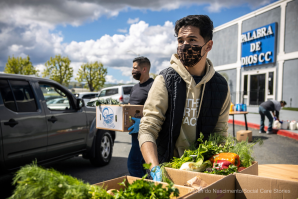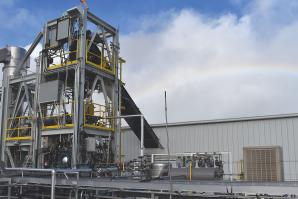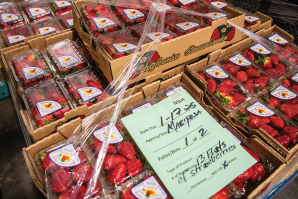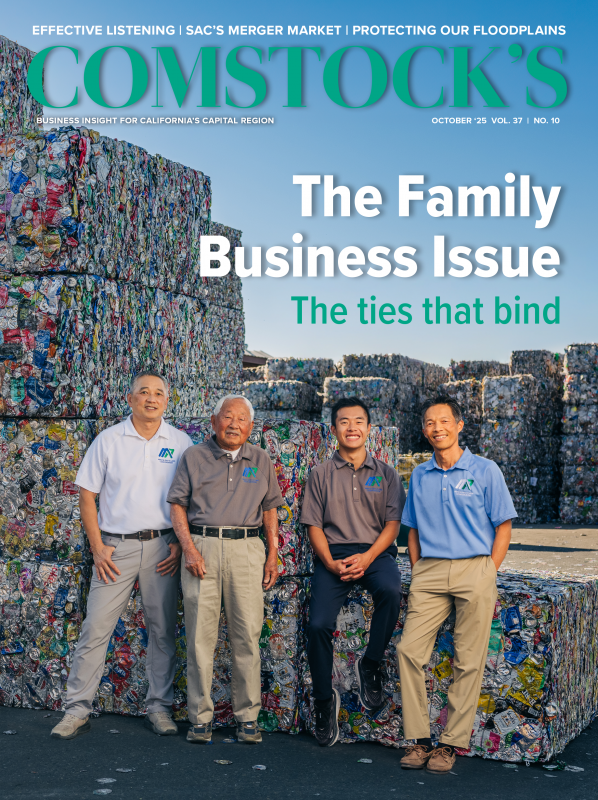Kenny Luong, president of Ming’s Recycling, says he works in “candyland.” At Ming’s biggest location on Florin Road in Sacramento, pressed bales of cans, bottles and other materials are piled as high as castle walls across the sprawling grounds. Riotously multicolored, they could be the building blocks of a fantasy world.
Kenny grew up in the recycling business, which may be why he can still see it with a child’s eye for wonder. His father, Ming Luong, started Ming’s Recycling in 1987, less than a decade after the Luong family — Ming, his wife Karen, and their four young children — arrived in the U.S. They were among the millions of people who fled Vietnam following the fall of Saigon, riding a fishing boat to a refugee camp in Malaysia before a church group sponsored their relocation to Laramie, Wyoming.
The Luongs lived in Wyoming for a year before moving to Sacramento, where a thriving Vietnamese community was taking shape (the city is now home to one of the 10 largest Vietnamese populations in the country). Ming started a small paper and cardboard recycling business out of the family’s S Street home in 1987 to make some extra money alongside his job as a mechanic at an auto body shop.
These photos of the Luong family were taken when they arrived on
the Malaysian island of Pulau Tengah after fleeing Vietnam.
(Photo courtesy of Kenny Luong)

Kenny, who was then in high school, remembers helping his father fill out all the complicated paperwork for permits and certifications. He stayed invested in the growth of the family business even after heading to UC Davis to become a dentist — so much so that he ended up transferring to the accounting program at Sacramento State to better help out. “I worked full time in the day and went off to school full time at night,” he recalls.
His brother Kevin took a similar, if longer, route; after working as an orthopedic surgeon, he came back home to join Ming’s as marketing director and chief financial officer in 2006. Their sister Amy Luong and her husband Minhson Nguyen also work at the business, as do Kenny’s wife Kelly Luong, her brother Raymond Kwong and his wife Carol Kwong.
Ming’s Recycling now operates three facilities, two in Sacramento and one in Hayward, and is the largest CRV beverage container recycling company in Northern California; about 30 percent of all beverage containers collected in the state eventually reach one of their facilities. The family achieved this growth without ever taking on debt, Kenny says, which helped them weather rough points like the 2008 recession and China’s ban on recycling imports in 2018 — an existential moment for the global recycling industry.
All of Ming’s business is now on the commercial side, including storing and transporting material for other companies and operating the balers that create those candy-colored blocks. The family hopes to expand in the coming year with the help of a $5.3 million grant from CalRecycle (funded by the nearly 30 percent of CRV that remains unclaimed) to install optical sorting equipment. Retail buyback is no longer part of the business. The south Sacramento location closed its buyback center in 2023 — partly because a customer allegedly assaulted two employees, but also because it hadn’t been profitable for years.
That was difficult for Ming, now 94, who held sentimental value for the retail side and its role in building up the fledgling business. Despite being some three decades over retirement age, Ming still works three to four hours every day. “As a mechanic, he just loves working on equipment. That’s in his blood,” Kenny says — though he notes that the computerized machines that now run the industry sometimes frustrate him. “It keeps him active, and keeps him healthy.”
Soon all three generations of the Luong family will be working at Ming’s. Kenny’s 23-year-old son, Brandon, recently decided to quit his accounting job in New Jersey and will start at the company in January. “We never push any of our kids to join the business. We want them to explore what they like, go out there and get some work experience before they even think about working for us,” Kenny says. “But we’re ecstatic that Brandon has decided to do that.”
–
Stay up to date on business in the Capital Region: Subscribe to the Comstock’s newsletter today.
Recommended For You

From Small Prune Farm to Global Enterprise
Family business spotlight: Taylor Brothers Farms in Yuba City is the world’s largest organic dried prune producer
When Earl Gorman Taylor planted his first plum tree on the 70 acres he bought in Sutter County in 1916, he could never imagine that his grandson Richard would one day turn it into a global empire. That’s exactly what Taylor Brothers Farms is now — the world’s largest producer and global distributor of organic prunes and prune products.

What a Waste
Californians throw away 11 billion pounds of food each year — a new recycling law aims to reuse it
Food waste recycling is vital to transforming California
into a circular economy. City and state organizations are
creating mandates to get us there.

Recycling: Turning Trash Into Energy
FastOx gasification could be the solution to our recycling crisis
Every year, the United States generates around 260 million tons of trash. And no one knows what to do with it. No one, that is, except serial entrepreneur Mike Hart, the CEO of Davis-based Sierra Energy.
Part of this month’s Innovation issue

Recycling Unused Food: On the Frontlines With the Agencies and Food Banks Making SB 1383 Work to Feed the Hungry
The food recovery process for SB 1383 is divided into separate tiers. Tier 1, which involves large grocery chains and food distribution centers, went into effect in 2022. The following year, Rancho Cordova’s locker alone recovered 800,000 pounds of food. In that same period, Sacramento Food Bank & Family Services oversaw the redistribution of 14.6 million pounds of edible food that came directly from Capital Area grocery stores.





